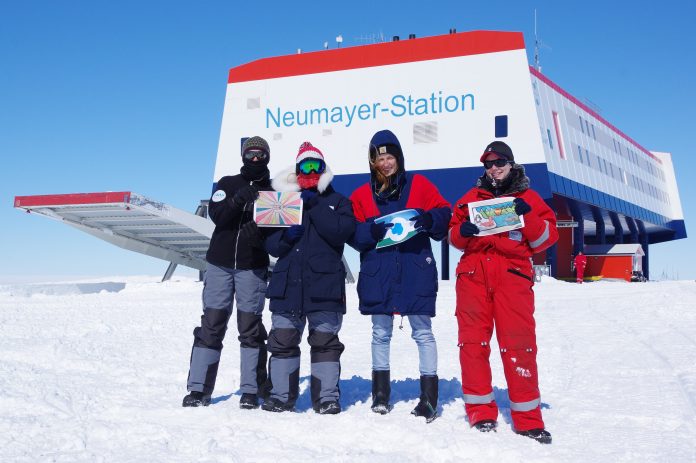
A group of seasoned experts from the UK Polar Network shed light on the wonders of polar science communication from North to South
The Earth is currently experiencing rapid changes in climate, driven by the anthropogenic emission of greenhouse gases into the atmosphere. The polar regions are uniquely sensitive to global warming, which has motivated polar scientific research and widespread communication of these issues to the public.
The UK Polar Network (UKPN), a national branch of the Association of Polar Early Career Scientists, is a volunteer-run organisation that began in 2007.
The UKPN aims to provide education and outreach focused on the polar regions to young people and the public, as well as improving networking and support for early-career polar researchers. With over 700 members, the UKPN is passionate about communicating polar science with the hope of enthusing and inspiring young people, as well as raising awareness of how these regions will change in the future.
Furthermore, through the UKPN network, early career researchers are presented with unique opportunities, such as our upcoming UK-Russia workshops, which aim to showcase the UK’s excellence in polar research and strengthen collaborative research that will address challenges in the rapidly changing polar regions.
Priorities for polar science communication
The UKPN communicates a wide breadth of polar research through discussion of proactive steps towards protecting the polar regions, rather than focussing on the negative perspective. The key challenge for the polar regions during the coming decades is how they will be altered by climate change.
For example, the Arctic is already experiencing extensive sea ice loss and may have ice-free summers by 2030 [Rosen, 2017]. This will not only affect animals, such as polar bears, but also indigenous Arctic communities which are often overlooked. The UKPN aids in communicating these issues faced in the Arctic, Antarctic and terrestrial ice caps, whilst aiming to provide knowledge on what we can do as individuals to reduce fossil fuel emissions and protect these vulnerable regions.
The UKPN also aims to inspire young people to engage with polar research, by sharing first hand our stories of life as polar researchers, such as getting the chance to see amazing wildlife and landscapes whilst based at isolated locations such as the Antarctic Halley research station. Successfully communicating the relevance of polar science topics can be challenging. By offering this personal perspective, the UKPN hopes to encourage wider public interest in these remote, hostile environments which can often seem disconnected from our day to day lives.
Furthermore, most of education and outreach is undertaken at events where interested people sign up and therefore reaching new audiences is a significant challenge. This is a priority for the UKPN going forward and we continue to promote polar science through school visits, science festivals and Reddit question and answers style events.
Polar research in school curricular
In recent years polar science has been in the spotlight and has captured the imagination and curiosity of young people, no doubt helped by the NERC ‘Name our Ship’ competition and the rise of ‘Boaty McBoatface’. Interest in the new Polar Research vessel (to be named RRS Sir David Attenborough) also led to the launch of the Polar Explorer Programme.
More recently Frozen Planet, Blue Planet 2 and the calving of the giant Iceberg A-68 off the Antarctic ice sheet have further raised the profile of the polar regions. This has increased public awareness of polar issues, as demonstrated by the UKPN led Antarctic flag programme which doubled in size from 2016 to 2017, sending over 600 Antarctic flags designed by schoolchildren to Antarctica from 100 schools worldwide.
Polar science can be utilised to explain underpinning concepts in STEM to students in fascinating and applied ways. The UKPN carries out school visits across the UK and has compiled a list of resources for polar science education within schools. The UKPN is also in the process of creating free interactive resources such as a polar food chain game that can be easily downloaded and a soundscape called ‘Sounds of Change: Greenland Ice Sheet Melt’ – which provides a dramatic and intriguing perspective of life and research on the ice sheet.
The UKPN plans to keep communicating polar science and inspiring young people in the hope of continually raising awareness for the polar regions, inspiring the next generation of polar scientists and promoting steps towards a more sustainable, low-emission future. If you want to get involved with the UKPN or want more information, then visit the website or email president@polarnetwork.org.
References
Rosen, J. (2017), Arctic 2.0: What happens after all the ice goes?, Nature News Feature, 542 (7640), https://www.nature.com/news/arctic-2-0-what-happens-after-all-the-ice-goes-1.21431
Chelsey Baker
PhD Student, University of Southampton
Dr Anna Belcher
Ecological Biogeochemist, British Antarctic Survey (BAS)
Dr Sammie Buzzard
Post-doctoral researcher, The Department of Earth Sciences, UCL
Kyle Mayers
PhD student, University of Southampton
Archana Dayal
PhD student, Department of Geography, The University of Sheffield
UK Polar Network










